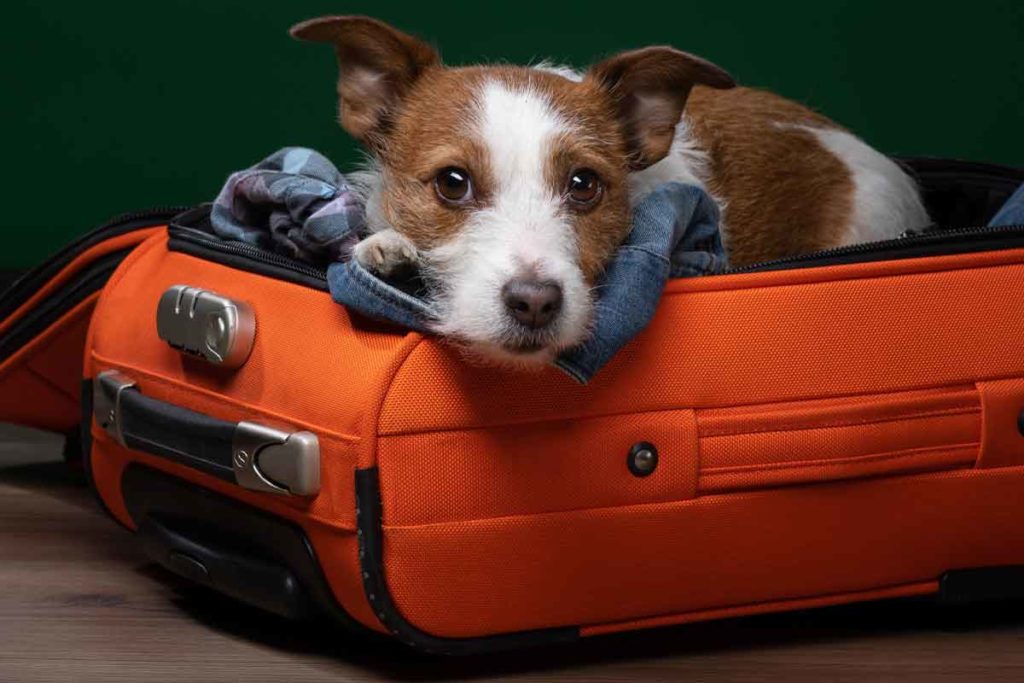Going on vacation is supposed to be relaxing but there is nothing more stressful than leaving your dog at the kennel for the first time. Many pet parents don’t have the option of a house sitter or leaving their pup with a friend, or the luxury of being able to take their pet along for the trip, so a kennel stay is the only choice. But, boarding isn’t a good fit for everyone. How can you determine if boarding is the right choice for your dog and how can you set your dog up for success?
Table of contents
- Pros and cons of boarding your dog
- Finding the right boarding fit
- Drop-off best practices
- How can ElleVet CBD + CBDA help your dog during their boarding stay
Pros and cons of boarding your dog
According to the American Pet Products Association, four percent of the 89.7 million dog-owning households in the United States used some type of kennel or boarding service in the past six months. Whether or not to board your dog is a big decision that requires many considerations. First, here are some pros and cons to help you get started:
Pros:
- Exercise and socialization – Good boarding facilities can offer great opportunities for dogs to play together. They will likely spend hours each day meeting new dogs, interacting with new people, and having ample play time. This mental and physical activity is great for your pup and will certainly tire them out. Of course, this is only a good environment for social and active dogs who are friendly and easy-going. Not all pups thrive in situations with other dogs, strangers, and lots of stimulation. This is overwhelming for many dogs, but highly social and confident dogs do very well at a high-quality boarding facility.
- Safe, professional care – The goal of boarding your pup is to leave them in the best possible care while you are away. Reputable kennels are staffed with pet care professionals that provide supervision and attention. Boarding facilities also have numerous safety measures in place—fenced enclosures, secure doors, soft surfaces—to ensure no harm comes to your pup during their stay. You should not have to worry about the quality of care your canine companion is receiving. However, this requires a pet parent to do their due diligence on any potential boarding facility.
- No strangers in your home – Not everyone is comfortable with having other people in their house as it can feel like an invasion of privacy. Preparing your home for guests may also require more hassle than you are willing to go through, or just may not be an option. One of the perks of dropping your pup off at a boarding kennel is that your home remains secure your entire trip. No mess, no intrusion!
Cons:
- Expensive – Boarding your pup at a professional kennel is more than likely on the expensive end of pet care options. Ideally, pet owners on a tight budget may be able to find a friend or family member to watch their dog, or hire an individual from popular platforms like Care.com, Rover, or Wag. An expensive boarding facility can dip into your trip budget and add extra stress to leaving your furry friend.
- Potential for hassle – The process of finding a good kennel, packing up your pup and their things, and transporting them to and from the facility can be time consuming and stressful. Particularly for pet parents leaving town on short notice or with inconvenient travel schedules, boarding can pose far more hoops to jump through than arranging for them to stay at their own house.
- Risk of injury and illness – Bringing your pup into an environment with other dogs comes with the risk of injury and contracting illnesses. Unfortunately, it is hard to guarantee that all dogs will get along and will not accidentally hurt themselves during playtime. A large group of dogs will form a hierarchy, but in the process, there can be conflict if the staff isn’t supervising at all times. The same is true for spreading illnesses like kennel cough, rabies, or parasites.
- Not for all dogs – Boarding simply is not the right fit for all dogs. Your pup may become stressed around other dogs or strangers, or prefer to stay and sleep in their own home. The constant noise of barking and unfamiliar sounds and activities is terrifying for many dogs. This stress can range from aggressive and destructive behavior to anorexia and fearful panic. Some high-quality boarding facilities offer quiet or senior rooms, as well as small group or individual walks that can be helpful, although many do not have these extra services.
Finding the right boarding fit

If you have determined that boarding at a professional kennel is a good option for you and your pup, it is important to do your research. Finding a safe and comfortable boarding option for your dog takes effort, but a good fit makes all the difference. Here is what you need to know as you start your kennel research:
Get recommendations you trust
Seek advice from your veterinarian, groomer, or dog-owning friends, family, and neighbors. Start by looking into the providers they have used and recommend.
Check customer reviews
Reading online reviews of boarding facilities can be an effective way to hear from real customers about their experiences. Just be sure to take these reviews with a grain of salt. Ask for references that you can talk to.
Visit in advance
Contact prospective kennels well in advance and arrange to visit the facility ahead of committing to board your pup. Seeing the space and meeting staff in person will allow you to get a better understanding of what to expect and how your pup will fit in. During your visit, look for:
- Fenced exercise area
- Secure, private, comfortable sleeping accommodations
- Clean, sanitary conditions
- Temperature controlled and ventilated space
- Fresh drinking water
- Attentive staff
Ask the right questions
There are many things you should know about the facility, organization, and staff before deciding to leave your pup at a kennel. Both you and your dog should be comfortable. Make sure to do your due diligence and ask all the right questions:
- Are staff certified in pet first aid?
- Do staff have ample pet care experience and references?
- Does the facility have a history of dog fights, escapes, or accidents?
- What is the process for vetting pups? Does the kennel screen for temperament, health checks, etc.?
- Is there 24-hour supervision of dogs?
- Does the facility use effective, pet-safe cleaning products?
- Does the facility have medical emergency and evacuation plans?
- How many dogs are typically at the kennel? What is the typical staff-to-dog ratio?
- How much exercise do dogs get during their stay?
- How much interaction do dogs get during their stay?
- Are there customization options available for your dog’s individual needs?
- How often are dogs given potty breaks?
- What are the immunization requirements?
- Which services are included in the boarding cost? What forms of payment are accepted?
- When is drop-off and pick-up?
- What is the cancellation policy?
- How much communication can you expect from staff during your dog’s stay?
- Can your dog come for a daytime, doggy daycare visit?
Drop-off best practices
You’ve determined that boarding is a good option for you and your pup. You’ve done your research to find a kennel that you like and trust. Setting your dog up for a successful boarding stay continues all the way through drop-off. Here are some best practices of what pet owners should do before and during drop-off:
- Practice round – For doggy boarding first-timers, pet owners may consider arranging an overnight sleepover or even a day at the kennel as a test run. This will help your pup get familiar with the space, other dogs, and staff. It will also help staff better understand your dog’s individual needs ahead of their longer stay.
- Health check – It’s a good idea to visit your veterinarian before leaving your pup at a boarding kennel. Some kennels require dogs to screen for parasites and other illnesses immediately before their stay and provide copies of medical records. Pet parents are commonly required to provide proof of up-to-date vaccinations for common diseases like rabies, kennel cough, distemper, hepatitis, parvovirus, and parainfluenza (DHPP booster). The American Medical Center of Mid-America recommends also making sure your dog is vaccinated for dog flu and is on flea, tick, and heartworm preventatives.
- Packing list – Be sure to deliver your dog to the boarding kennel with plenty of food for their stay, as well as their bed, favorite toys, health records, and medications. Don’t skimp on instructions for medications, food, allergies and sensitivities, personality traits, preferences and potential challenges, etc. It’s better to provide as much information as possible to kennel staff than too little. Experts at VCA Animal Hospitals emphasize that it is best to stick to routine and consistency with your dog’s food while boarding, as quick changes can cause gastrointestinal upset. You may also wish to bring their food and water dishes from home. Veterinarian Dr. Lisa Lippman recommends also packing a piece of home like a shirt or blanket that smells like you to help comfort your pup while they are away from you and in a foreign place. Don’t forget to leave contact information to reach you and an emergency contact!
- Calm departure – To minimize stress surrounding your departure, stay calm and upbeat as you leave your pup at the kennel. Your goodbye should be short and sweet without making a big fuss. You’ll be back to pick up your furry friend in no time, and they are in good hands while you are away!
How can ElleVet CBD + CBDA help your dog during their boarding stay?
ElleVet can help set your dog up for success in a boarding situation. We recommend starting your dog on our chews or soft gels a few days ahead of the kennel stay and giving them the appropriate dose twice daily. Then, on the day of drop-off, give the appropriate amount of our high potency Calm & Comfort product about an hour and a half ahead of leaving for the kennel. This will help calm your dog during the most stressful part of their visit—the drop-off and first night.

Instruct the staff to give ElleVet’s CBD + CBDA soft gels or chews twice daily with meals to help keep your dog calm for the duration of the visit. Provide some Calm & Comfort situational use chews as an emergency stash in case your dog becomes highly agitated or stressed. These chews are extremely effective in addressing your dog’s acute level of stress without sedating them. ElleVet products can help your dog manage their stress and calmly adjust to boarding, and you both will be much happier!









